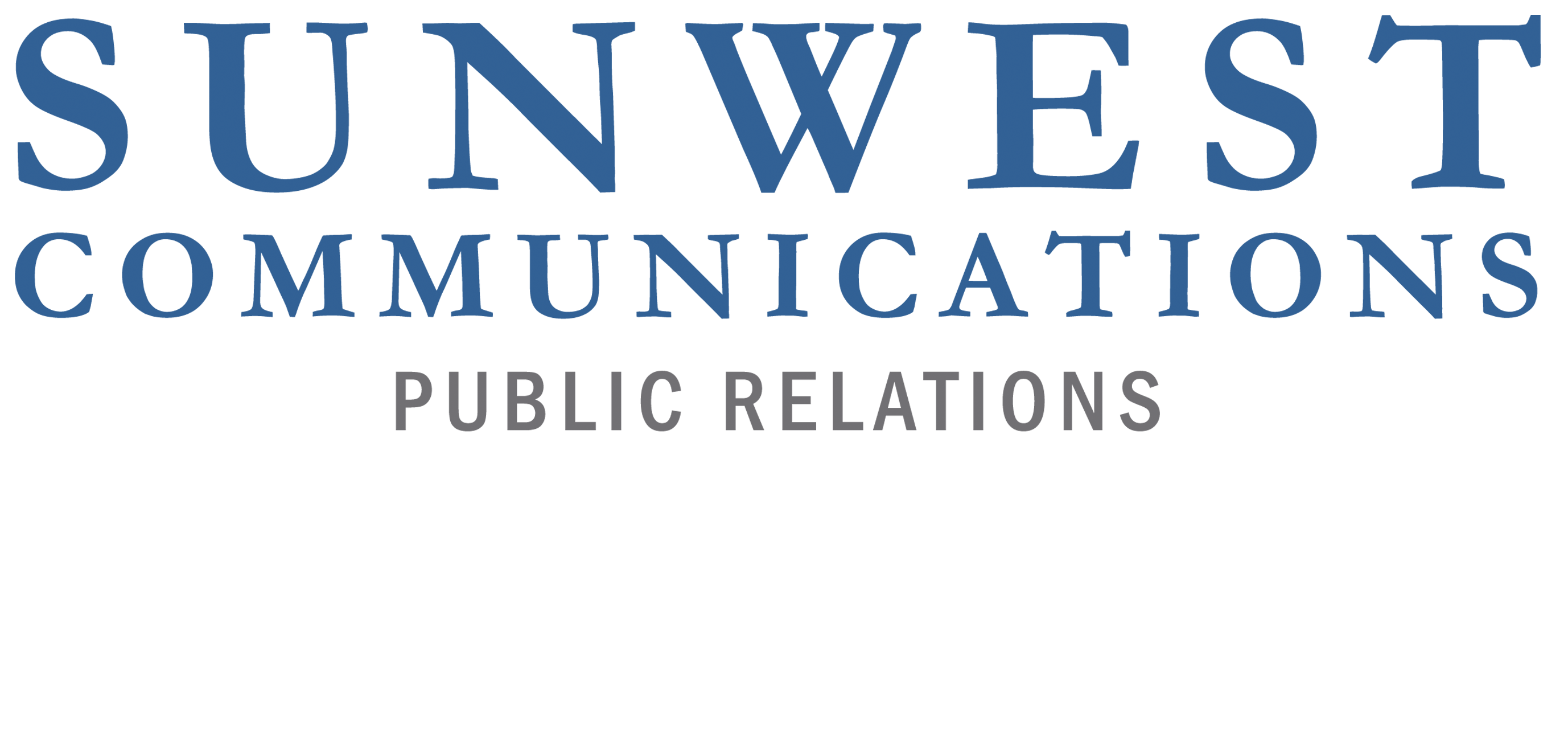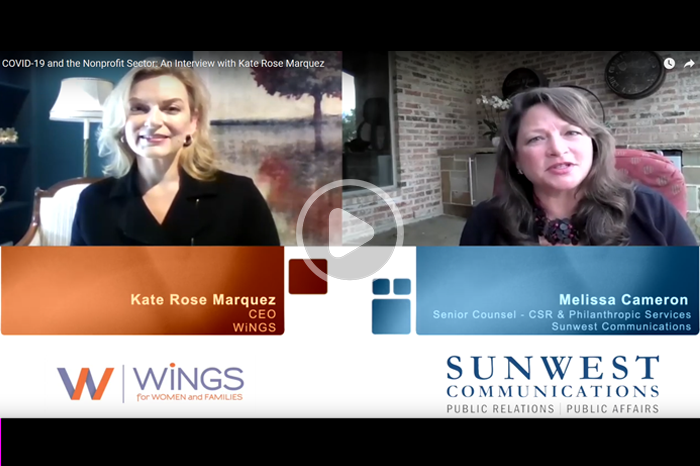COVID-19 and the Nonprofit Sector: An Interview with Kate Rose Marquez
April 20, 2020
Hi. Welcome. I’m Melissa Cameron, senior counsel, CSR and philanthropic strategies at Sunwest Communications. We are so fortunate today to have with us the CEO of WiNGS. Women in Need of Generous Support, formerly the YWCA of Dallas, a 100-year-old organization that has been providing services to women and their families, lifting them up out of poverty and providing services for them to be sustainable. In this time of COVID, can you tell us how WiNGS is affected by it and how you are providing services during this time?
Sure. So, Melissa, one of the unique things about WiNGS is our true one-on-one support that we give to all the women in our programs, whether it’s health care focused or financially focused. So, you can imagine how we’ve had to pivot to still support the women that we always have supported. We’re doing that through telehealth appointments, through webinars, but also through one-on-one video appointments. We’re really changing how we do things so we can meet these women in their time of crisis so we can provide immediate, instantaneous support to them, whether that is in the form of financial coaching and helping them maintain assets that they do have, understanding their rights and responsibilities as a debtor, understanding what resources are available to them in the community. The other side of that from our NFP program, which is our Nurse-Family Partnership, we’re able to communicate with those moms through FaceTime, through telehealth appointments to check on those moms and babies and make sure that they are doing well and they are healthy and safe in this stressful environment we’re all in.
Great, well tell us what kind of resources are WiNGS offering during this time? I know you’re typically providing some sustainability type of financial classes, but you’re also hearing some different things from your clients and they have different needs today than they did pre-COVID.
That’s right. So pre-COVID, we were providing classes and workshops and mentorships to help women understand finances, become financially literate, pursue new careers, pursue entrepreneurial opportunities. All of those things, on the one hand, we’re still doing but we’re doing differently. Meaning the woman that we’re helping wrap her brain around how to budget, how to be financially literate – we’re not only doing that, but we’re doing it in a bit more frantic pace because these are women that need to know which bills do I pay, which bills don’t I pay? What are the utilities doing that are deferring payments? If you’re a woman with limited assets and you’re an hourly worker who’s been furloughed, what do you do with the assets that you have? How do you preserve those assets so that you’re able to provide for your children?
I will say I’ve been to your website and you have probably one of the most robust, comprehensive resource guides that I’ve seen for the community. And in terms of a suite of other services, not even WiNGS services, but how can I find out information for myself and be self-sufficient during this time?
You know, I agree with you. And that’s a real kudos to our staff. And I will tell you that this website is a result of the kind of questions that our members are asking. What do I do about mental health care? What do I do about my wireless bill? How do I talk to my internet provider or my TV services provider? What language do I use? What are the resources? What are my rights and my responsibilities to my creditors? Those are things that we were being asked so we were very quickly pulling these together. So it goes way beyond just our scope of expertise. We’ve brought in our collaborators and we have put everything on our website that we feel is a resource to anyone in the community.
Can you tell me, Kate Rose, what sort of resources in response to COVID-19 have you had to create or adapt in order to meet those needs?
Well, we’ve taken all of our curriculum that we use in our classes, in our one-on-one mentoring and have really focused them through the lens of COVID-19, where we were teaching financial literacy, we were teaching debt reduction, we were teaching asset preservation before, we now are doing that through the lens of COVID-19. Where we were working with small business owners before on launching and growing their business, it’s now turned to keeping their businesses open and coming up with really creative ways to serve their customers so they will be around in two or three months.
When people think of crisis, they think of immediate needs – food, water, shelter – and certainly you have staff that can help direct people to those resources. But when you see the robust offerings of intellectual programs, what is the motivation behind that?
Sure. I think that the intellectual resources are very important because what we’re doing, if you go back to the old proverb of if you hand someone a fish you feed them for a day, if you teach them to fish, they’ll eat for a lifetime, there’s no question that immediate relief is necessary at this time. But dovetailing with that is the intellectual tools that we’re providing these women to be able to provide for their children and themselves. Knowing how to preserve their assets, knowing what resources are available to them so that they can have other opportunities they’re not aware of. We’re providing opportunities that are going to sustain these women and their families, not only the next couple of weeks, but in the long term.
Kate Rose, I can only imagine during this time there’s a lot of people looking for help. Are you seeing an influx of clients during this time?
You know, we are. At first, I think the first couple of weeks people were a little paralyzed, a little shocked, like, is this for real? And reality is setting in. In the last week, week and a half, we’ve seen a real uptick in the calls that we’re receiving, in the requests for one-on-one financial coaching. People are starting to understand there’s a lot of information out there and they’re not quite sure how to sort through it all and our financial coaches are experts at that and can help them sort through all of this information.
We have the opportunity to work with a number of companies, corporations who are looking at how they’re supposed to be responding during COVID-19. They’re ready now to interact with the community. If you had a chance to talk face-to-face with companies here in our neck of the woods or across the country, how would you advise them? And I’m sorry, I’m putting you on the spot like this. But how would you, what would you ask of them and how could they help support WiNGS?
Well, I would remind them that women make less money in the same jobs as men. And households headed by women are more likely to be at or below the poverty line. They’re more likely to be asset poor. So any chance they get to support these women, these moms, through teaching them financial literacy, through hiring them, through mentoring them through one of our programs, we would love that. We want to be the bridge between these women and opportunity.
I love that phrase, the bridge – being the bridge. That’s a great role that companies can take today. I agree with you. Kate Rose, you remind me of the three R’s again and how WiNGS is truly in the middle of responding to this crisis and meeting people where they are in providing basic needs. You are planning for the recovery for tomorrow and certainly you are helping the community with resiliency for the future. Thank you so much for being with us today. We appreciate your time. Thank you.

